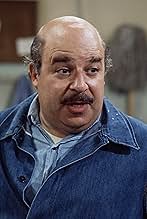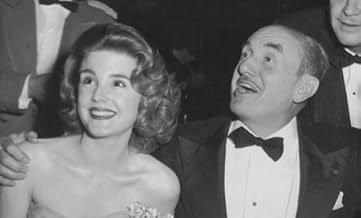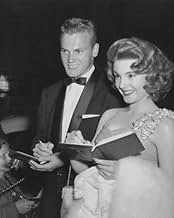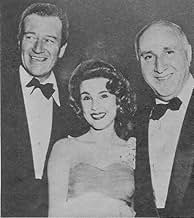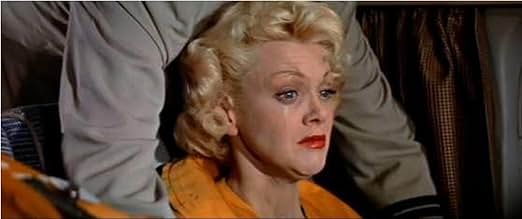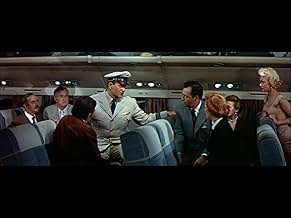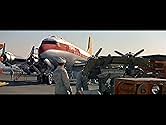Ein Verkehrsflugzeug auf einem Trans-Pazifik-Flug bekommt Triebwerksprobleme und der Pilot verliert die Nerven. Nun liegt es an dem abgewrackten Co-Piloten Dan Roman, das Flugzeug sicher ins... Alles lesenEin Verkehrsflugzeug auf einem Trans-Pazifik-Flug bekommt Triebwerksprobleme und der Pilot verliert die Nerven. Nun liegt es an dem abgewrackten Co-Piloten Dan Roman, das Flugzeug sicher ins Ziel zu bringen.Ein Verkehrsflugzeug auf einem Trans-Pazifik-Flug bekommt Triebwerksprobleme und der Pilot verliert die Nerven. Nun liegt es an dem abgewrackten Co-Piloten Dan Roman, das Flugzeug sicher ins Ziel zu bringen.
- 1 Oscar gewonnen
- 5 Gewinne & 7 Nominierungen insgesamt
- Gonzales
- (as Gonzalez Gonzalez)
Empfohlene Bewertungen
In the early 50s, people were just getting used to the idea that they could climb aboard a big man-made eagle and soar above cars, buses, and trains. It was a thrilling, but scary, idea, not unlike traveling on the Titanic. And so, with "The High And The Mighty", Hollywood created the first big budget movie that conveyed the idea of risk, in commercial air travel. Throughout the film, the overriding emotion is insecurity, not only among passengers but among the crew as well. Since the film was a cinematic prototype, I can see how its nerve-wracking story would appeal to moviegoers of that era. The film's angelic theme music thus provided inspiration to help viewers overcome their fear of something new and different, something potentially life threatening.
Since the early 50s, air travel has lost its sense of adventure. The film to us seems quaint and dated. What seemed odd to me, for example, was the ticket counter. The pace was leisurely, and the attention was very personal. Then, on board the plane, the stewardess made sure that the passengers got personalized attention. At one point, even the captain, upon request, reassured a nervous passenger. Those were the days.
First time viewers also need to be aware that this film is talky and dreamily melodramatic. The emphasis is on story and acting, not special effects or high-powered action. And then there is that final Act. It is different perhaps from what most of us probably would expect. But again, we must take into account the era in which the film was made.
Fifty years after its release, "The High And The Mighty", as a film, cannot compete with its own theme music. The sweeping orchestration, like music generally, transcends time and spans the generations. By contrast, technology, and mankind's reaction to technology, changes. The film's story thus has a different meaning to us than it did to the original moviegoers. If you can place the film in its proper historic context, you have a better chance of appreciating the film for what it was then, not for what it is now.
I can remember when I was in high school in the '60s some ten years after the movie was released (I have never seen it since) and Mr. Marcellino was a guest at one of our assemblies and demonstrated his amazing versatility at whistling and even performed the letters of the alphabet as an example of how he had mastered his craft. His range was phenomenal as he portrayed the instruments of the orchestra and then performed the entire Rhapsody in Blue as well as popular works all by whistling without accompaniment, but admitted that the theme for TH&TM was his proudest achievement. The Academy of Motion Picture Arts and Sciences has never recognized the contributions of all musical forms to the success of pictures as gauged from their mention in passing at the annual telecast Oscar ceremonies, but if they had, this singular performance would have been guaranteed a Special Oscar. Truly, once it is heard, neither it nor the film can ever be forgotten, but will haunt one for years to come! This classic film is the fitting epitaph for Messrs. Wayne, Tiomkin, and Marcellino. Would that we all could be remembered for such an achievement.
I would love to add The High and the Mighty to my collection of John Wayne films, but the Wayne Family Trust has got to allow this film to be converted to either a DVD or a VHS format. I know they are waiting for the time when they can squeeze the maximum number of dollars out of it, but if they aren't careful, they will wait too long and the world will have moved so far beyond the ideas, concepts and technology of the 50's that the film will not appeal to the younger generation of purchasers of movies.
It's more than just Wayne's performance that is being withheld from the public. I am also a great admirer of the work of the great British actor, Robert Newton and he turned in a marvelous performance here. So did Jan Sterling, Claire Trevor, Paul Fix, Lorraine Day and all the rest of the cast. Their fans deserve to see these actors in this film too. The only actor I could live without is Robert Stack. He has never done a thing for me. But the film as a whole is wonderful and should be released...ASAP
Wusstest du schon
- WissenswertesErnest Gann's novel clearly indicates that the character of Sally McKee has resorted to prostitution in order to survive. The film version, made at the height of Hollywood censorship, was unable to explicitly state this; however, Gann slyly managed to insinuate the information during Sally's entrance, wherein two sailors at the Honolulu airport recognize her and pointedly remark, "Hey, look! Remember?"
- PatzerNear the end of the film, Air Traffic Control clears the aircraft to land on "runway 39" This is impossible. Runways are numbered are within 10 degrees of their actual magnetic heading, and since there are only 360 degrees on the compass, the highest runway number possible is "runway 36".
- Zitate
Alsop: She may be put together with paste and flour, but that woman has something. What would you say it was?
Miss Spalding: Practice. Plenty of practice.
- Alternative VersionenThe song "The High and the Mighty" (with lyrics) does not appear in the original 1954 release of this film. However, the studio wanted the hugely popular, chart-topping song to be nominated for the Best Song Academy Award that year. According to AMPAS regulations, the song could not be nominated because it was no officially sung in the film, even if would be heard elsewhere. To satisfy these regulations, a version was released towards the tail-end of 1954 for a few nights only with the song inserted into an Exit Music. The Academy then decided to give the song a nomination on the basis of these screenings. The song lost to "Three Coins in a Fountain".
- VerbindungenEdited into Geheimagent des FBI (1959)
Top-Auswahl
- How long is The High and the Mighty?Powered by Alexa
Details
Box Office
- Budget
- 1.470.000 $ (geschätzt)
- Weltweiter Bruttoertrag
- 4.334 $
- Laufzeit
- 2 Std. 27 Min.(147 min)
- Sound-Mix
- Seitenverhältnis
- 2.55 : 1


